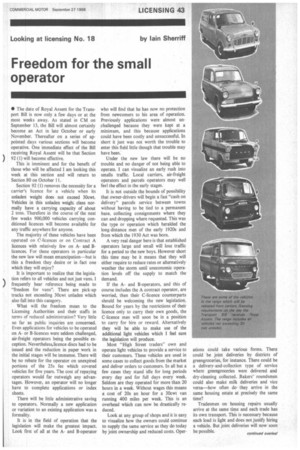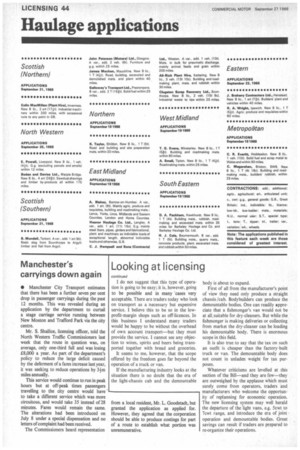Looking at licensing No. 18
Page 45

Page 46

If you've noticed an error in this article please click here to report it so we can fix it.
Freedom for the small operator
by lain Sherriff
• The date of Royal Assent for the Transport Bill is now only a few days or at the most weeks away. As stated in CM on September 13, the Bill will almost certainly become an Act in late October or early November. Thereafter on a series of appointed days various sections will become operative. One immediate effect of the Bill receiving Royal Assent will be that Section 92 (1) will become effective.
This is imminent and for the benefit of those who will be affected I am looking this week at this section and will return to Section 80 on October 11.
Section 92 (I) removes the necessity for a carrier's licence for a vehicle when its unladen weight does not exceed 30evvt. Vehicles in this unladen weigh', class normally have a carrying capacity of about 2 tons. Therefore in the course of the next few weeks 900,000 vehicles carrying conditioned licences will become available for any traffic anywhere for anyone.
The majority of these vehicles have been operated on C-licences or on Contract A licences with relatively few on Aand Blicences. For these operators in particular the new law will mean emancipation—but is this a freedom they desire or in fact one which they will enjoy?
It is important to realize that the legislation refers to all vehicles and not just vans. I frequently hear reference being made to "freedom for vans". There are pick-up trucks not exceeding 30cwt unladen which also fall into this category.
What will the freedom mean to the Licensing Authorities and their staffs in terms of reduced administration? Very little so far as public inquiries are concerned. Even applications for vehicles to be operated on Aor B-licences were seldom challenged, air-freight operators being the possible exception. Nevertheless,licence discs had to be issued and the reduction in paper work in the initial stages will be immense. There will be no rebate for the operator on unexpired portions of the 25s fee which covered vehicles for five years. The cost of repaying operators would far outweigh any advantages. However, an operator will no longer have to complete applications or index sheets.
There will be little administrative saving to operators. Normally a new application or variation to an existing application was a formality.
It is in the field of operation that the legislation will make the greatest impact. Look first of all at the Aand B-operator who will find that he has now no protection from newcomers to his area of operation. Previously applications were almost unchallenged because they were kept at a minimum, and this because applications could have been costly and unsuccessful. In short it just was not worth the trouble to enter this field little though that trouble may have been.
Under the new law there will be no trouble and no danger of not being able to operate. I can visualize an early rush into smalls traffic. Local carriers, air-freight operators and parcels operators may well feel the effect in the early stages.
It is not outside the bounds of possibility that owner-drivers will begin a fast "cash on delivery" parcels service between towns without having to be tied to a permanent base, collecting consignments where they can and dropping where requested. This was the type or operation which heralded the long-distance men of the early 1920s and from which the 1930 Act was born.
A very real danger here is that established operators large and small will lose traffic for a period to the new boys. However short this time may be it means that they will either require to reduce rates or alternatively weather the storm until uneconomic operation levels off the supply to match the demand.
If the Aand B-operators, and this of course includes the A contract operator, are worried, then their C-licence counterparts should be welcoming the new legislation. Bound for years by the restrictions of their licence only to carry their own goods, the C-licence men will soon be in a position to carry for hire or reward. Alternatively they will be able to make use of the additional light vehicles which I feel sure the legislation will produce.
Most "High Street traders" own and operate light vehicles to provide a service to their customers. These vehicles are used in some cases to collect goods from the market and deliver orders to customers. In all but a few cases they stand idle for long periods every day and for full days every week. Seldom are they operated for more than 20 hours in a week. Without wages this means a cost of 20s an hour for a 30cvvt van running 400 miles per week. This is an overhead which can now be drastically reduced.
Look at any group of shops and it is easy to visualize how the owners could continue to supply the same service as they do today by joint ownership and reduced costs. Oper
ations could take various forms. There could be joint deliveries by districts of greengroceries, for instance. There could be a delivery-and-collection type of service where greengroceries were delivered and dry-cleaning collected. Bakers' roundsmen could also make milk deliveries and vice versa—how often do they arrive in the same housing estate at precisely the same time?
Tradesmen on housing repairs usually arrive at the same time and each trade has its own transport. This is necessary because each load is light and does not justify hiring a vehicle. But joint deliveries will now soon
be possible. continued overleaf I do not suggest that this type of operation is going to be easy; it is, however, going to be possible and in many 'cases very acceptable. There are traders today who look on transport as a necessary but expensive service. I believe this to be so in the lowprofit-margin shops such as off-licences. In this business I understand many traders would be happy to be without the overhead of own account transport—but they must provide the service. I cannot see any objection to wines, spirits and beers being transported together with bread and groceries.
It seems to me, however, that the scope offered by the freedom goes far beyond the operation of a truck or van.
If the manufacturing industry looks at the situation there is no doubt that the era of the light-chassis cab and the demountable body is about to expand.
First of all from the manufacturer's point of view they need only produce a straight chassis /cab. Bodybuilders can produce the demountable bodies. One can readily appreciate that a fishmonger's van would not be at all,suitable for dry-cleaners. But while the fishmonger is making deliveries or collecting from market the dry-cleaner can be loading his demountable body. There is enormous scope in this field.
It is also true to say that the tax on such an outfit is cheaper than the factory-built truck or van. The demountable body does not count in unladen weight for tax purposes.
Whatever criticisms are levelled at this section of the Bill—and they are few—they are outweighed by the applause which must surely come from operators, traders and manufacturers who welcome the opportunity of replanning for economic operation. The new licensing system may well herald the departure of the light vans, e.g. 5cwt to 7cwt range, and introduce the era of joint operation and demountable bodies. Great savings can result if traders are prepared to re-organize their operations.
































































































































































































